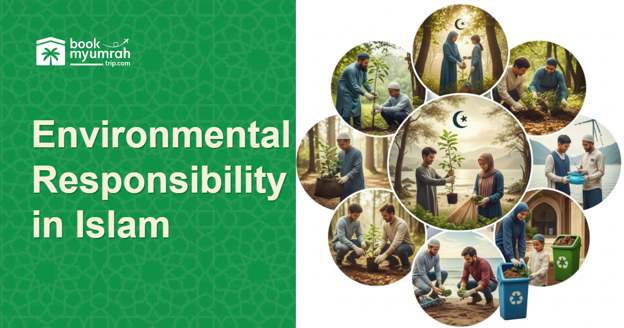Environmental Responsibility in Islam: What the Quran Teaches About Climate Change

Team BookMyUmrahTrip
Faith Meets Ecology
In present times, the earth's melting ice caps, extreme heat, and increased water in the seas are receiving global prominence, and environmental care is demanded loudly. Yet, what the majority does not apprehend is that the Islamic faith has always been advocating for sustainability, moderation, and conservation of life through its doctrines.
Islam is not merely a set of rituals, but it is a lifestyle (Deen) which instructs human behavior through the principles of justice, compassion, and moderation. The Quran is imbued with environmental knowledge, which was disclosed over 1,400 years ago. This wisdom strongly relates to the problem of climate change today.
Guardianship on Earth: The Quran’s Command for Balance
The book of Allah says that man is referred to as "Khalifah," or guardians or caretakers of the earth. He says:
“It is He who made you heirs upon the earth…” ~(Quran 6:165)
This is not an appointment for domination but rather responsibility. The fact that one is a Khalifah implies that one has to walk that fine line that Allah has created in the universe. The Quran warns:
“And the heaven that He lifted and placed the balance, that you will not break the balance.” ~(Quran 55:7-8)
This mizan is what environmental harmony is all about. When man abuses nature's resources haphazardly, such as deforestation or polluting and releasing carbon without any restraint, he will definitely interfere with nature's order. Thus, the present climate disaster is not simply a matter of ecology losing, but rather a moral and spiritual trespass.
Responsibility and Moderation: Islamic Teaching on Ethics
Moderation (wasatiyyah) is one of the most repeated themes of Islamic teachings. The Quran commands:
“Indeed, the wasteful are the kinfolk of the devils.” ~(Quran 17:27)
This is a powerful statement. It teaches Muslims that it is spiritually devastating to be wasteful with food, water, or energy. Prophet Muhammad ﷺ strengthened this through his very modest and sustainable life. He advised:
“Don’t waste water even when you are at a running river.” (Hadith, Ibn Majah)
Consider how that principle relates to the current world of excessive consumption and pollution.
These are not new ideas. Mindful consumption of water and cutting down on plastic usage go well with the Islamic idea of being responsible towards God.
Nature as a Speech of Good: Spiritual Lessons from Nature
The Quran encourages the believers to consider the natural world mountains, rivers, animals, changing of seasons, etc. As the signs (ayat) of the wisdom of Allah.
“And He is the one who spread the earth and established mountainous and watery regions in it... Certainly these are signs for people to reflect on.” (Quran 13:3)
It is a reflection (tadabbur) that promotes spiritual closeness to nature. To the Muslims who are very conscious of the environment, every breeze or leaf, or even a drop of rain, will serve as an alarm of the creative power of God. Therefore, to destroy the environment is not only physical destruction but also failure to value and safeguard the evidence of Allah (s.w.t.).
By polluting a river or destroying a forest, one is not only defiling the planet but also offending the holiness of the holy trust (Amanah) that Allah has granted to human beings.
Taking Principle to Practice: Building a Green Ummah
Islam does not consist of theory but action. Environmentally aware Muslims around the world are reanimating these Quranic postulates with community-based activities:
Green Mosques: Solar-powered mosques in countries such as Jordan, the UK, and Indonesia are a groundbreaking step in lowering carbon footprint.
Eco-Friendly Hajj: These projects will call for negligible plastic use and the right waste disposal during Hajj and Umrah.
Sustainability in Education and Policy: The non-profit Islamic Foundation for Ecology and Environmental Sciences (IFEES) is introducing sustainability in education and policy.
This lesson resembles the Prophet’s teaching, where he stated:
“When a Muslim plants a tree or sows the seed in the ground, and a bird, or an individual, or an animal consumes it, it is a charity gift.” ~(Bukhari 2320)
The planting of trees, preservation of water, and upholding of renewable energy, among other simple things, are expressions of an environmentally conscious Muslim soul.
Islam and Climate Change: The Moral Idea
So, is the problem of climate change just an environmental or political concern? No. It’s more of a moral responsibility to address for us humans. Islam is asking the devotees to be just (adl) and avoid corruption (fasad) when it says:
“Do not bring corruption on the earth after its reformation.” ~(Quran 7:56)
An eternal warning is found in this verse. One of these forms of fasad is environmental degradation, which is a corruption of what Allah made pure. It is a good omen that the increasing recognition of environmentally friendly Muslims is using faith-based activism to drive sustainable living.
The Islamic ethics perfectly align with international objectives of sustainability, calling upon humankind (especially Muslims) to conserve ecology, minimize waste, and implement fairness for coming generations.
Conclusion: Reviving the Sacred Trust
The message of the holy book of Allah is quite clear: the Earth is a holy trust, not a commodity that must be exploited. With the increasing impacts of climate change, Muslims are challenged to seek the eternal wisdom of their religion again.
The Ummah can inspire the world to take up Islamic stewardship, moderation, and compassion, not with force, but with faith. It is not just a choice to become environmentally conscious Muslims but a spiritual duty.
The meetup of faith and ecology provides the next generation who can and will take care of the planet as a form of worship, admitting that we owe the Creator who formed everything in perfect harmony.


